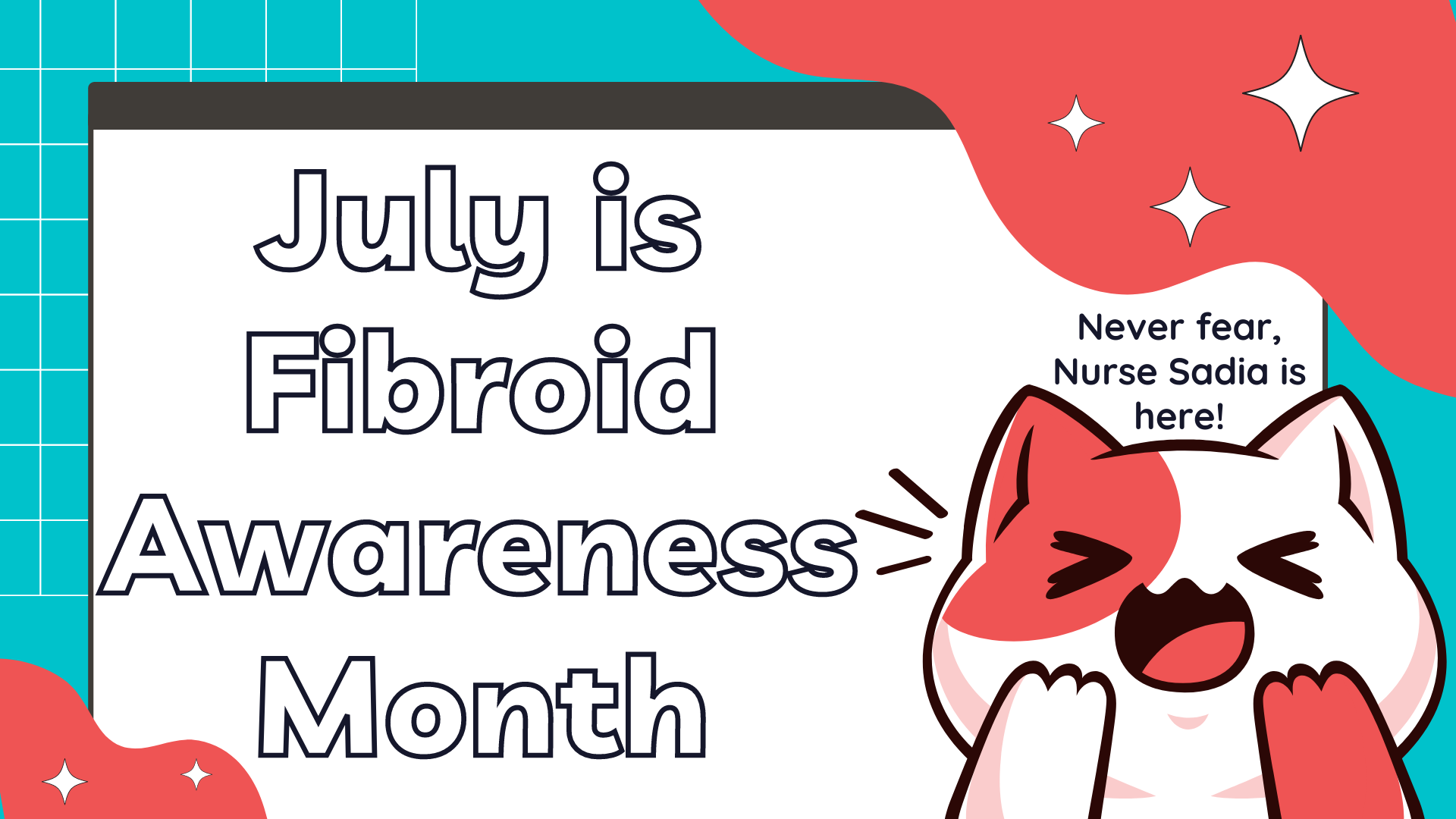Fibroid Awareness Month 2022 – What You Need to Know

Happy Wednesday! July is Fibroid Awareness Month 2022! This week, I will be talking about all things related to uterine fibroids. Whether you have fibroids or just want to learn more, this post is for you!
Welcome to my blog! I’m Sadia, a women’s health nurse practitioner, women’s health content writer, and social commentator. I do many things, but mostly, I write and speak my mind. All views my own unless stated otherwise. Grab something to drink and scroll away with me. It’ll be good for both of us, promise.

Fibroid Awareness Month 101 – Your Questions Answered
What are fibroids?
Fibroids are benign (which also means non-cancerous) growths that consist of smooth muscle cells and connective tissue. Also, another term for fibroids is leiomyomas. Fibroids grow in the uterus and can appear alone or in groups. These growths can be as small as a grain of rice or as big as a cantaloupe. In some cases, fibroids can grow into the uterine cavity or extend outside of the uterus.
How common are they?
Studies show that approximately 20-50% of people with a uterus of reproductive age (ages 18-45) currently have fibroids. Fibroids are extremely common, where over 75% of all people with a uterus will develop fibroids between ages 18-45. See why there’s a fibroid awareness month?!
However, about one-third of fibroids are large enough to be detected by a health care provider during a physical exam. Because of their unpredictable nature, fibroids are often undiagnosed or missed during routine gynecological exams.
In more than 99% of fibroid cases, the tumors are not cancerous and do not increase the risk for uterine cancer.

What causes fibroids?
The cause of fibroids is unknown, like many other gynecological conditions. Scientific research rarely includes people with uteri since we are often seen as irrelevant and our pain dismissed in society.
Some research suggests each tumor develops from an abnormal muscle cell in the uterus and multiplies rapidly when encountering the estrogen hormone, which promotes rapid growth. However, more research is needed to learn more about what causes fibroids.
Who is at risk for fibroids?
Risk factors may include:
- Family history of fibroids
- Obesity
- High blood pressure
Unfortunately, there is no singular risk factor for fibroids. On the other hand, Black women are more likely to develop fibroids than other women, they are diagnosed at younger ages and they more often require treatment. Non-Black women of color also have higher rates of fibroids than white women. There is no known specific reason for the high incidence of fibroids in Black women.
Some speculate that it could be as a result of chronic stress from chronic racism or intergenerational trauma.
What Are Some Symptoms of Fibroids?
There are some people who do not experience symptoms with fibroids, depending on the location and size. However, those with larger fibroids or multiple fibroids can have really intense symptoms.
Some fibroid symptoms are:
- Heavy or prolonged periods (often lasting more than 5 days)
- Bleeding between periods (also known as spotting or unscheduled bleeding)
- Abdominal discomfort and/or fullness
- Pelvic pain that can radiate to the lower back
- Bladder symptoms, such as wanting to pee often or difficulty emptying the bladder
- Bowel symptoms, such as severe constipation or excessive straining with bowel movements
What happens if fibroids are left untreated?
Sometimes, they go away on their own. Other times, they can grow. Fibroids are REALLY unpredictable! This is why fibroid awareness month exists!
Fibroids can interfere with someone’s sex life and fertility. Some people report pain during sex, trouble getting pregnant, or chronic pelvic pain.
How Do I Know if I Have Fibroids?
The standard to determine if someone has fibroids is a pelvic ultrasound. There are other imaging options available to see if there are fibroids present, but those are often more expensive. In order to have a pelvic ultrasound, you would need to see a health care provider.

How Can I Manage Fibroids?
There are many approaches to fibroids because they are often so complex and vary for every person. Some people will never notice they have fibroids. Others will feel chronic pain daily until they are removed.
There are some medication options to consider, such as over the counter pain medications, like ibuprofen. Contraception, such as the Depo shot or birth control pill, can also help with decreasing the bleeding.
There are also surgical methods as well, but surgery only removes the present fibroids. Even after fibroid surgery removal, some people can have fibroids reappear. Living with fibroids is not easy, especially if they are recurrent and interfere with your quality of life.
If you think you have fibroids, talk to your health care provider about your concerns! Share this post to raise awareness of fibroids and fibroid awareness month. It is time to finally be heard and recognized.
See you next week!
Yours Truly,
Nurse Sadia
References
https://www.hopkinsmedicine.org/health/conditions-and-diseases/uterine-fibroids
https://labblog.uofmhealth.org/rounds/understanding-racial-disparities-for-women-uterine-fibroids

DISCLAIMER: Nurse Sadia is a licensed and board-certified women’s health nurse practitioner and registered nurse. All information on this page and on www.digitalhealthcommunicator.com is for educational and informative purposes only. It is not meant to be used for self-diagnosing or self-treatment of any health-related conditions. While the information presented has used evidence-based research and guidelines for accuracy, Nurse Sadia cannot guarantee any inaccuracies as healthcare is rapidly evolving.
This information should not be used to substitute professional medical advice. Nurse Sadia is not responsible or liable for any damages, loss, injury, or any negative outcomes suffered as a result of personal reliance on the information contained on this website. Nurse Sadia also makes no guaranteed positive outcomes. Information is also subject to change as needed without notice. Please consult with your healthcare provider before making any healthcare decisions and ask about guidance for specific health conditions. Please do not disregard the advice of your healthcare provider or delay seeking care for health care conditions.





You must be logged in to post a comment.